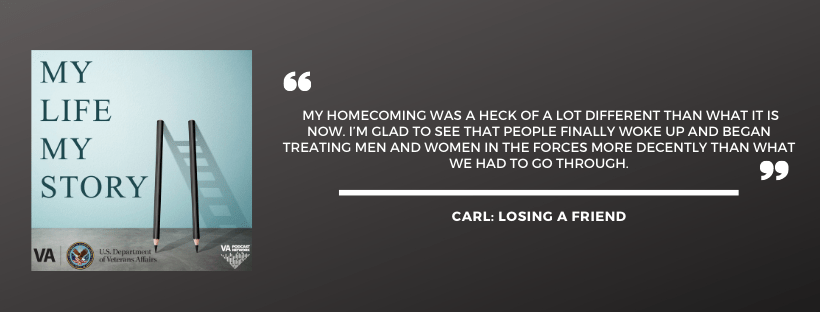Imagine that you’re a patient in the hospital, maybe recovering from a knee surgery or pneumonia. You’re lying in bed, watching something boring on TV when you hear a knock at the door.
“Come in,” you say, and a stranger walks into your room. The person is carrying a notepad and pen, and they ask if you’d like to be interviewed about your life.
This happens every day at VA hospitals around the country. The strangers walking into the rooms are writers. The patients who choose to tell their stories are America’s Veterans. The program is called, “My Life, My Story”
In the seven years since the program started, we’ve interviewed over 5,000 Veterans at over 50 VA hospitals. We’ve spoken with Veterans as young as 22 years old and as old as 108.
Most of the interviews last about an hour. After that, we write up a story that’s about 1,000 words long. When we’re done, we read the story back to the Veteran and, once they’re happy with it, we put it in their medical record so that their doctors and nurses can read the stories, too.
Helps staff get to know their patients better
The goal is to make health care a little more personal, to help staff get to know their patients better.
But one thing we’ve noticed about these stories: while it’s nice to read them on the page, they’re even better read aloud. On this podcast, we’re going to do just that. For Season One, we’ve selected a dozen of our favorites. In a few cases, the Veterans themselves will read their stories. For the others, we found voice actors or VA staff to read for us.
On this, our first episode, we begin with the story of Carl, a Vietnam War Veteran. The reader is Thor Ringler, who directs the “My Life, My Story” national project from Madison, Wisconsin.
We hope you enjoy these stories as much as we enjoyed writing and recording them.
Seth Jovaag is a writer/editor/producer for the My Life, My Story Project.
Topics in this story
More Stories
The Medical Foster Home program offers Veterans an alternative to nursing homes.
Watch the Under Secretary for Health and a panel of experts discuss VA Health Connect tele-emergency care.
The 2024 National Veteran Suicide Prevention Annual Report provides the foundation for VA’s suicide prevention programs and initiatives.






